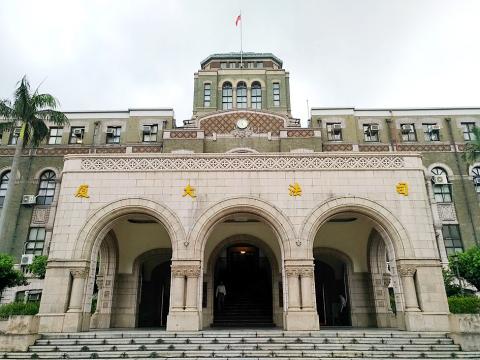The Council of Grand Justices on Friday issued a constitutional interpretation expanding students’ right to appeal disciplinary actions taken against them by their schools.
In Constitutional Interpretation No. 784, the council ruled that a student’s right to file appeals in administrative courts, which are distinct from the court system that handles criminal and civil law, would not be subject to limits.
Under a 1995 ruling, known as Constitutional Interpretation No. 382, students could only file an appeal if the punishment would “change that student’s status” and “hinder his/her opportunity to receive an education.”

Photo: Wu Cheng-feng, Taipei Times
The review was prompted by the cases of two students in the past few years who received demerits — which appear on one’s academic record and can be considered in university admissions — but could not launch an appeal, as their cases did not meet the conditions outlined in Constitutional Interpretation No. 382.
In a 2014 case, a junior-high student from Hsinchu surnamed Fu (傅) called in sick on the day of an exam. Although the student later took a make-up test, school regulations stipulated that it be graded with a maximum possible score of 70.
In a 2016 case, a high-school student from Taichung surnamed Chang (張) received a demerit for the possession of cigarettes, and later received a second demerit for riding a motorcycle without a license.
On Friday, the council ruled that the students’ right to appeal their punishments could not be subject to restrictive conditions, thereby supplanting Constitutional Interpretation No. 382.
In Taiwan’s legal system, the Council of Grand Justices is responsible for issuing judicial interpretations, while the Supreme Court serves as the court of last resort for civil and criminal cases.

An essay competition jointly organized by a local writing society and a publisher affiliated with the Chinese Communist Party (CCP) might have contravened the Act Governing Relations Between the People of the Taiwan Area and the Mainland Area (臺灣地區與大陸地區人民關係條例), the Mainland Affairs Council (MAC) said on Thursday. “In this case, the partner organization is clearly an agency under the CCP’s Fujian Provincial Committee,” MAC Deputy Minister and spokesperson Liang Wen-chieh (梁文傑) said at a news briefing in Taipei. “It also involves bringing Taiwanese students to China with all-expenses-paid arrangements to attend award ceremonies and camps,” Liang said. Those two “characteristics” are typically sufficient

A magnitude 5.9 earthquake that struck about 33km off the coast of Hualien City was the "main shock" in a series of quakes in the area, with aftershocks expected over the next three days, the Central Weather Administration (CWA) said yesterday. Prior to the magnitude 5.9 quake shaking most of Taiwan at 6:53pm yesterday, six other earthquakes stronger than a magnitude of 4, starting with a magnitude 5.5 quake at 6:09pm, occurred in the area. CWA Seismological Center Director Wu Chien-fu (吳健富) confirmed that the quakes were all part of the same series and that the magnitude 5.5 temblor was

The brilliant blue waters, thick foliage and bucolic atmosphere on this seemingly idyllic archipelago deep in the Pacific Ocean belie the key role it now plays in a titanic geopolitical struggle. Palau is again on the front line as China, and the US and its allies prepare their forces in an intensifying contest for control over the Asia-Pacific region. The democratic nation of just 17,000 people hosts US-controlled airstrips and soon-to-be-completed radar installations that the US military describes as “critical” to monitoring vast swathes of water and airspace. It is also a key piece of the second island chain, a string of

The Central Weather Administration has issued a heat alert for southeastern Taiwan, warning of temperatures as high as 36°C today, while alerting some coastal areas of strong winds later in the day. Kaohsiung’s Neimen District (內門) and Pingtung County’s Neipu Township (內埔) are under an orange heat alert, which warns of temperatures as high as 36°C for three consecutive days, the CWA said, citing southwest winds. The heat would also extend to Tainan’s Nansi (楠西) and Yujing (玉井) districts, as well as Pingtung’s Gaoshu (高樹), Yanpu (鹽埔) and Majia (瑪家) townships, it said, forecasting highs of up to 36°C in those areas